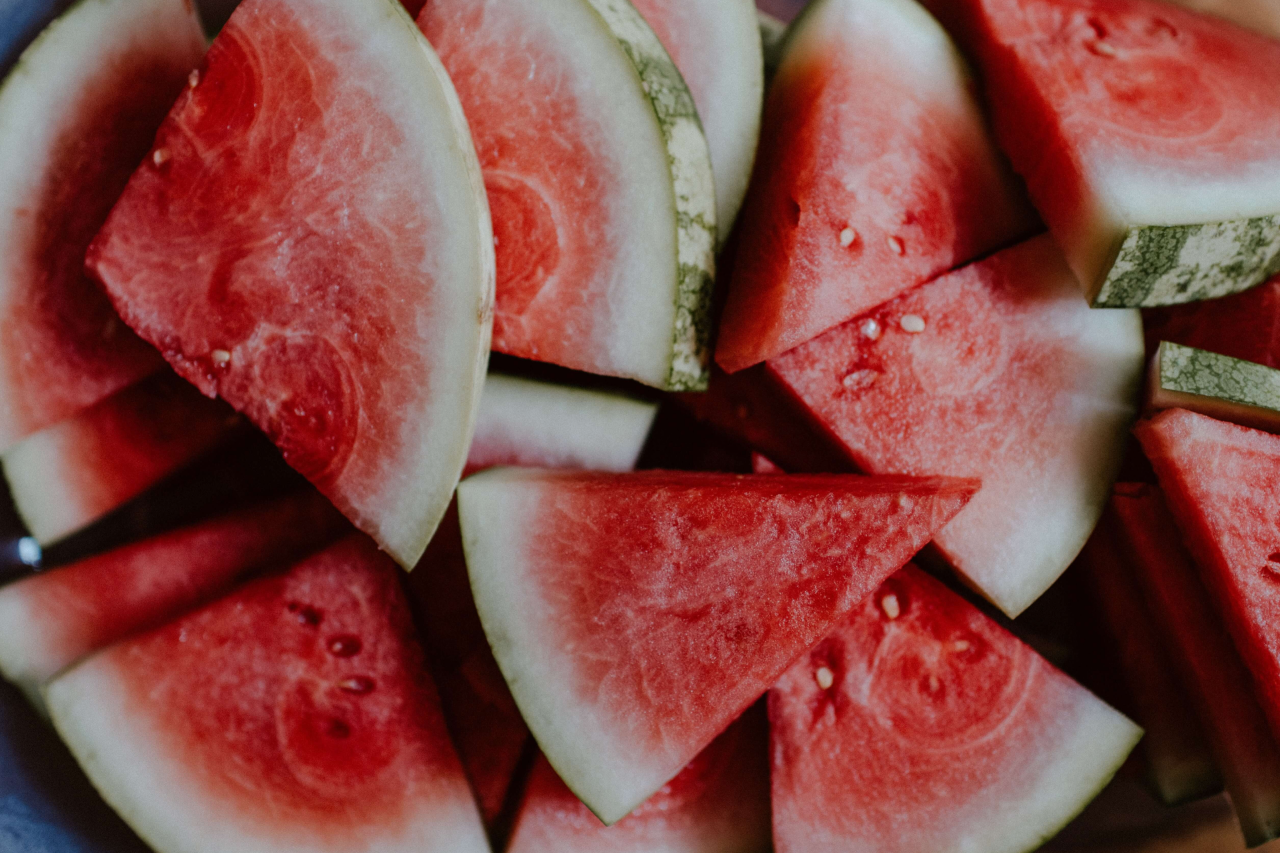
Can Dogs Eat Watermelon?
We love our dogs and if there's one thing dogs love to share with us, it's "people food!" The last thing we want to do, however, is to give our furry friends treats that aren't good for them.
Yes, watermelon is safe for dogs but we recommend that you don't let them eat the seeds and the rind of the watermelon.
Watermelon is made up of mostly water and can be a healthy treat for your dog as long as they don't eat too much in one sitting. Dogs eat watermelon because they like the texture and the hydration, but this juicy fruit also adds additional vitamins and minerals into their diet.
The most important thing to note is that they can digest (and even benefit from) the red and light green fruit contained inside the watermelon rind. However, they shouldn't eat the seeds and the rind itself.
Dogs eat watermelon all the time during the hot summer months but what are the potential health benefits or risks of giving your dog this type of fruit? Let's take a look if watermelon is safe for dogs.

Dogs and Watermelon: The Benefits & The Risks
According to the American Kennel Club, routine vet visits can cost up to $1,500 a year. This doesn't include emergency vet trips or unforeseen surgeries. A lot of emergency trips to the vet occur after your dog eats something they shouldn't.
Despite popular beliefs, dogs are actually omnivores, not carnivores, and throwing fresh fruit and veggies into their daily intake is always a good idea! Now, let's talk about feeding your dog watermelon and how to safely feed this healthy snack to your dog.
Health Benefits of Feeding Dogs Watermelon
Watermelon contains some of the vitamins that do your doggy good. Watermelon has Vitamin A, which is good for eye, cell, and immune health. It also has B6, which keeps their coat shiny and strong, and the kind of Vitamin C that can keep allergens and sniffles at bay.
Although watermelon does contain sugar, it won't release quickly into their bloodstream. This is because the fiber in watermelon wraps around the sugar and actually slows its natural release.
Fiber has many health benefits. Some kinds of fiber may even promote good gut health. Watermelon doesn't top the charts for fiber content, but it does contain a bit, which is better than nothing!
Watermelon also contains a large amount of lycopene, a phytochemical that is found in naturally red fruits and vegetables. Lycopene acts as an antioxidant, fighting free radicals in both the human and dog system. Free radicals can damage your dog's cells and create issues in her immune system. Research has shown that lycopene can be beneficial to slow the growth of cancer.
Finally, watermelons, true to their name, are mostly made of water. That means that watermelon is both low in calories and hydrating, making them a good alternative to pre-packaged treats on a hot day. An occasional watermelon can provide your dog with many different nutritional benefits such as improving gastrointestinal upset stomachs.
Health Risks of Feeding Dogs Watermelon
The parts of a watermelon that you should avoid feeding to your dog are the seeds and the rind. While they are not toxic, they are difficult to chew and digest and could pose a threat to your dog's teeth and digestive tract.
If your dog eats too many seeds at once, they may begin to cause intestinal blockage, making it difficult to pass waste and causing extreme discomfort.
Smaller dogs are more at risk from watermelon seeds than larger dogs, because they have smaller intestines. If you are looking to give your dog a healthy treat it is important that you only give them fresh watermelon as a juicy fruit will provide the most amount of taste.
The rind is difficult to digest and could pose problems to your dog's digestive tract. It's also very solid, and if your dog has issues with their gums or teeth, sinking into the rind could cause pain or even the cracking or loss of teeth. Feeding watermelon to your dog on a too frequent basis can cause your dog to consume too much sugar which could upset their stomach.
What to Avoid When Giving Dogs Watermelon
There can always be too much of a good thing. Even if you're careful to use seedless watermelon and cut the fruit away from the rind before sharing pieces of watermelon with your dog, there are still ways that this sweet treat can, well, backfire.
When you're introducing new food to your dog's diet, start with small amounts.
Diarrhea is a telltale sign that your pup has had too much of something they don't often eat. If they get diarrhea every time you feed them watermelon, it probably isn't right for them.
What Part of A Watermelon Can't Dogs Eat?
The mature watermelon seeds are not safe for dogs to eat. This is a common mistake when someone offers and tosses a whole slice of watermelon to the pup. If that happens, they can accidentally ingest a large amount of watermelon seeds, which may create an intestinal blockage in smaller breeds or those with extremely small intestines. If your dog happens to eat an occasional watermelon seed it probably isn't a big deal but it is recommended to not feed them watermelon seeds as the hard seeds can have a difficult time moving through the digestive track.
The outer green part of the watermelon is safe for your dog to eat, but the rind itself should not be ingested. The tough consistency poses a risk for an intestinal blockage because the digestive track will have a difficult time breaking down the tough texture of the watermelon rind.
Before feeding your dog watermelon, make sure to remove the rind and seeds.
Is Seedless Watermelon The Safest Option?
Seedless watermelons are best for your dog. The seeds aren’t mature enough or in high enough volume to negatively impact digestion, so the fruit poses less of a risk than any other with seed-heavy varieties.
Can Dogs Eat Too Much Watermelon?
Too much watermelon can cause problems, especially for dogs who are prone to medical difficulties. Too much of any type of snack has the potential for dogs.
Your dog's regular dog food should account for 90% of their diet with 10% coming from treats. Treats can be an occasional indulgence, but too many will make your dog overweight or diabetic.
Too much watermelon can cause a stomachache or leaky bowels for your dog. Smaller dogs should be given much less watermelon than larger dogs would as a snack.
Does Watermelon Have Too Much Sugar For Dogs?
Watermelon has sugar but also high fiber. This thick insulation means that it releases sugars in the bloodstream more slowly than other fruits. However, if your dog is diabetic watermelon should not be offered in excess until you consult with your vet about proper serving sizes and the diet suitable for your dog. Any type of fruit or snack should be given to your dog in moderation so your dog doesn't consume too much natural sugar in one serving.
How Much Watermelon Can I Give My Dog?
Watermelon is typically thought to be a safe fruit for dogs to eat in moderation, however it is important that you don't give your dog too much watermelon or any type of fruit because most fruits contain natural sugar as well as fiber. These minerals can be beneficial to the health of your dog in moderation, but if your dog eats too much in one sitting, it could cause an upset stomach or even cause diarrhea in more severe cases. If you have a larger dog, your dog can eat more watermelon compared to a small breed. It is recommended that you only give your dog a small amount of cut up seedless watermelon.
When introducing your dog to watermelon or any other type of food, you should start small and then gradually work your way up to larger quantities of food if your dog is reacting well to it. You should always monitor your dog for any signs of discomfort or an upset stomach after giving them a new type of food. It isn't recommended that you give your dog watermelon with seeds or the rind of the watermelon as these could be difficult for your dog to digest.
Why Does My Dog Like Watermelon So Much?
Many dogs absolutely love the taste and texture of watermelon and this is mostly because of the sweet taste of the fruit but also the high water percentage that the fruit is made up of. Many dogs love the additional hydration that the get from eating watermelon but there is something about the soft texture that many dogs enjoy eating any even playing with. Some dog parents will choose to freeze small chunks of watermelon to give to their dog and the frozen texture will add more sensation to your dogs fruit. So if your dog doesn't seem to like eating watermelon, you can try to freeze it to give it a more crunchy sensation when they eat it.
Best Way to Feed Your Dog Watermelon
If your dog has special nutritional needs, it's best to speak with your vet before introducing them to watermelon.
As long as you remove the rind and seeds, there's no wrong way to feed your dog watermelon. That being said, we love to get creative when we're brightening our dogs' days with "human food." Here are a few of our favorite ways to feed our dogs a refreshing summer snack!
Feed Dogs Frozen Watermelon Chunks
As long as your dog doesn't have gum or enamel issues that create sensitivity to cold, frozen watermelon is a great option. Frozen watermelon has a malleable, chalky texture, meaning that it shouldn't crack or break your dog's teeth the way ice cubes could.
Cut your watermelon into small chunks and spread them on a freezer-safe tray. Within an hour or two, they should be flash frozen and ready to enjoy or store to savor throughout the year. Frozen food can provide your dog with a unique flavor and texture that many dogs will enjoy. Many pet parents will notice the benefits of watermelon after giving your canine companion the fruit for a few weeks.
Watermelon Jerky
If you have a dehydrator, try making watermelon jerky! Watermelon jerky is a good alternative to the processed jerky pet food found in pet stores.
Cut the watermelon into strips rather than cubes. Remove the seeds and dehydrate until it has a leathery feel. You can keep these pieces of watermelon jerky on hand for a few days to reward good behavior or to keep your dog entertained with fun, healthy, human food!
A Healthy Dog is a Happy Dog
At Wild Earth, our goal is to make healthy protein dog food and dog treats that make it easier for you to raise a healthy pup!
If you're ready to change the way you think about your dog's diet, visit our online shop to see what we have to offer. Keep checking in with us to learn more about your dog's health!




























